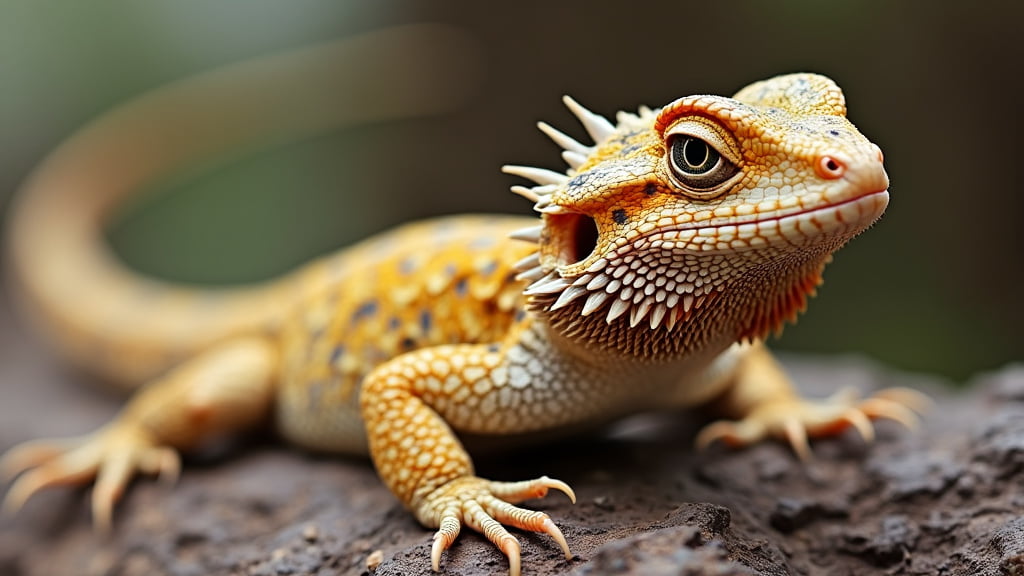Welcome to Dug’s Bugs!
At Dug’s Bugs, we love exotic pets and know how important their diet is, especially for our favourite spikey friends, the bearded dragons. Whether you’re new to owning one or have had one for a while, knowing what’s safe for your dragon to eat is crucial. So, let’s answer the question of the day: Can bearded dragons eat apricots?
Understanding Bearded Dragon Nutrition
Importance of a Balanced Diet
A balanced diet is essential for a bearded dragon’s health and happiness. These cool reptiles need a mix of proteins, vegetables, and fruits. But how much of each do they need?
Your bearded dragon’s diet changes as they grow. When they are young, they need more protein. As adults, they need more plant-based foods. Just like us, they need the right balance to stay healthy.
Dietary Components
Here’s a simple breakdown:
- Insects: About 50% of their diet. Think crickets, mealworms, and other bugs.
- Vegetables: Around 40%. Leafy greens and other veggies are great.
- Fruits: Keep it to about 10% of their diet. Fruits are treats, not main meals.
Can Bearded Dragons Eat Apricots?
Nutritional Value of Apricots
Apricots are rich in vitamins A and C, fibre, and potassium. In small amounts, they can be a yummy and nutritious treat for your bearded dragon.
Health Benefits
Apricots can provide some good vitamins, but they should only be given in moderation because of their sugar content. I once gave my bearded dragon, Spike, a tiny piece, and he loved it! But he only gets it as a special treat now and then.
Potential Risks of Feeding Apricots
Sugar Content
Apricots have a lot of sugar. Too much can cause obesity and other health problems, just like giving a kid too much candy!
Oxalates and Phosphorus
Apricots have oxalates, which can interfere with calcium absorption. This is important because bearded dragons need the right calcium-phosphorus balance for strong bones. An imbalance can lead to metabolic bone disease, which is detrimental to reptiles.
Digestive Issues
Too much apricot can upset your dragon’s stomach or even cause an allergic reaction. Always start with a tiny piece and watch for any adverse reactions.
How to Safely Introduce Apricots into Their Diet
Preparation Tips
If you want to give apricots a try, here’s how to prepare them:
- Wash the apricot to remove any pesticides.
- Peel it to avoid choking hazards.
- Chop it into very small pieces.
Moderation is Key
Apricots should be a rare treat. Consider giving a small piece once or twice a month. For Spike, I give him a tiny bite once a month, and he loves it.
Alternative Fruits for Bearded Dragons
Other Safe Fruits
Not sure about apricots? Try these fruits instead:
- Blueberries: Small but full of nutrients.
- Strawberries: Sweet and popular with bearded dragons.
- Apples: Just remove the seeds first.
- Mangoes: A tasty tropical option.
Benefits of Variety
Offering different fruits gives your bearded dragon a range of nutrients and keeps meals exciting. It also stops them from getting too attached to just one kind of fruit.
General Dietary Tips for Bearded Dragon Owners
Hydration
Keep your dragon hydrated. Always have fresh, clean water available. Sometimes, mist their veggies with water to help them get more fluids.
Avoiding Toxic Foods
Here’s a list of foods to avoid because they’re toxic to bearded dragons:
- Avocado: Very toxic.
- Rhubarb: Could be deadly.
- Onions and Garlic: Harmful to their digestion.
Personal Experience
After trying different things, I found it’s best to feed my bearded dragons in the morning. This way, they have all day to digest their food under the heat lamp, preventing digestive issues before bedtime.
Conclusion
So, can bearded dragons eat apricots? Yes, but be careful. Always give them sparingly and make sure to prepare them properly to avoid any health issues. Trying different fruits can be fun, but always watch your dragon for any adverse reactions.
When in doubt, talk to your vet. They can give you advice based on your dragon’s specific needs. We’d love to hear your experiences and any questions you have. Share in the comments below!
Additional Resources
For more info on caring for bearded dragons, check out detailed information on the best diet for bearded dragons. Doing your research will help your bearded dragon live a happy and healthy life.
Thank you for visiting Dug’s Bugs! Happy feeding!

